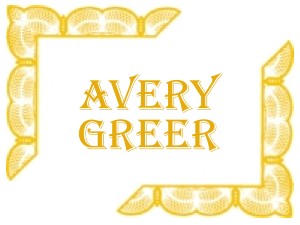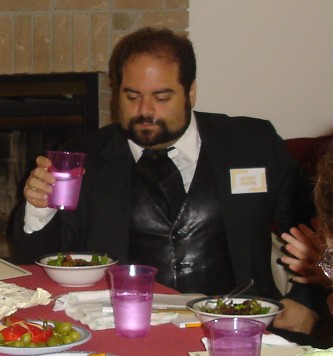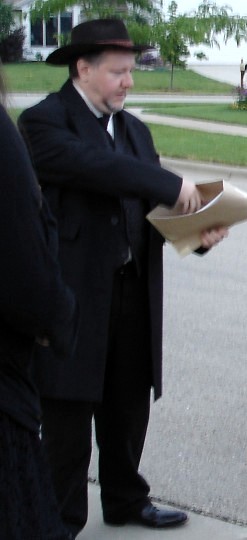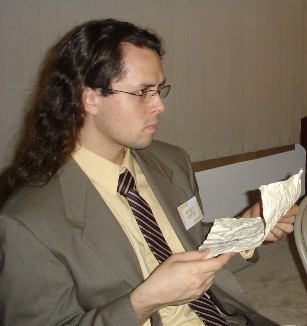WARNING: This game is the ancestor of the Clerical Error game written more recently by Kathleen De Smet. The newer game has undergone heavy revision. If you read this game you will both spoil some secrets and end up with some wrong information.
The original character concept for Avery was a victorian rail baron from around the turn of the century who represented the sin of greed. To some degree I think Avery was my favorite character. Kathleen and I had a great time writing his story. I see him as the epitome of the American dream, except when Avery succeeded he went more than a little wrong. Avery's wife, Maria, was also a bit strange, because she showed up in both Avery's story and Gloria's story, but she didn't have her own character story.
Avery's important item was his gold coin. We couldn't really get our hands on old or expensive coins for our players. We ultimately settled on using a commemorative coin that came with one of Brian's large cookbooks (I can't remember which series). The coin was about the right size and weight and if you didn't look too closely it looked like an old time dollar.
Avery's original concept paragraph:
Avery Greer
Avery was born to a poor farmer, the seventh of nine children. When he was 15, his parents gave him enough money to get to town and live in a boarding house for a few weeks and told him to get a job. Strapping lad that he was, he got a position working on the railroad pounding in the stakes and ties. Avery felt comfortable here, earning money with his sweat and being cared for by the system, and eventually he rose through the ranks to become foreman. His life changed one day when the railroad company finished his section of track and left town, firing most of its employees on the way out. Avery's supervisor had been fond of him and saw potential in the boy's determination and cleverness. Before he departed, he pressed a gold dollar in Avery's hand with instructions to use it wisely. Thus bereft, Avery's naive trust in the company collapsed and he hardened his heart, realizing that the only way to get ahead in life was to take it into his own hands. With a silver tongue and what little money he had left, he convinced a small, hand-picked team of his former co-workers to go with him to California where a rail baron named Mr. Consuelo was living. Once there, he ambushed Mr. Consuelo with a list of ideas that he had developed to improve efficiency and increase profit, and offered his services and those of his team. Consuelo hired them and eventually Avery married his daughter Maria to gain her dowry, a closer tie to his boss, and eventually her lands. The company thrives under the new regime and by the time Consuelo dies a couple years later, Avery is a very rich man. He is beginning to regret his young marriage to Maria, for his sights have now set on a much wealthier heiress. He begins to look for an excuse for a divorce and when Maria proudly announces that she is finally pregnant, he publicly denounces her as an adulteress and casts her and the unborn child out. The way is clear for him to pursue his rich lady and continue his climb to the top. 1900.
Friday's Avery.Avery's final character story (as given to players):
Avery Greer, age 35. 1905
I have known poverty. I was born the seventh of nine children. My parents were poor farmers on the edge of the western frontier. They loved us, but love can't fill bellies. So for my fifteenth birthday they gave me enough money to get to town and a week's rent and told me I was on my own. It was hard leaving my family, but that's the beauty of America; you may have to work for it, but you can always make a better life for yourself.
That's exactly what I did. Before the money ran out, I was working for the Union Pacific Railroad, pounding in stakes and setting ties. I liked it there; I was earning my keep with the sweat on my brow. Most of the other workers were older than I was, but once they saw I would work as hard as any of them, they welcomed me as one of their own. It didn't take long for me to work my way up through the ranks to become a foreman. The Company took good care of me and my men, and for a while, life was good.
That all changed the day our section of track was complete. Suddenly the Company didn't need us anymore, so when they moved on to their next project, they fired nearly everybody on their way out of town. My men and I were left in the middle of Nowhere, Nebraska with almost no money and nothing but a shanty town to shelter us from coming winter. I was outraged. How could The Company abandon us like that, after we had given them our all? Every one of us had trusted them to take care of us. I vowed then and there that I would never again allow others to make me so powerless. My life was in my hands now.
In the end, only my supervisor showed any remorse for the Company's betrayal. He had taken a shine to me when I started suggesting improvements, like a more efficient rotation of the labor schedule. He always said I had potential. As he climbed on the last passenger train out of town, he pressed a gold dollar in my hand and wished me well. I stared at that coin for a good long time after the train faded from view. By sundown, I had a plan.
I gathered my most trusted men and with a little sweet-talkin', convinced them to stow away with me on a freight train to California. That's where the money was.
When we got out there, it didn't take me long to find the hotel where the businessmen congregated. I became friends with the bell-hop and through him learned about a certain Mr. Consuelo. He was perfect for my plan; he owned one of the smaller rail companies which was struggling financially. I drew up a list of potential improvements that could give him a leg up on the competition.
Saturday's Avery.Mr. Consuelo took dinner alone in the hotel's restaurant on Thursday evenings. Since they would never let me in dressed as a laborer, I reluctantly pawned my gold coin to buy a suit and a shave. I waited until he was midway though the dinner course, because no man can walk away from a good steak. Before he could protest, I had seated myself at his table and began rapidly presenting my ideas.
At first he just stared, but as the words began to sink in, he seemed to grasp the potential and held up his hand for me to slow down. I could see the interest gleaming in his eyes and by the cheese course we had an agreement.
Within a week, I was on the payroll and had landed jobs for all of my men in Mr. Consuelo's outfit. Immediately upon receiving my first payday, I walked to the pawnshop and reclaimed my lucky gold coin; it would never leave my pocket again.
In my new role as the surveyor's advisor, I was allowed the freedom to implement my suggestions as I saw fit. The ace up my sleeve had always been one of my Nebraska boys who had a real eye for dirt and could tell the quality of the bedrock at a dozen paces. I promoted him to assistant surveyor and had him plotting track. I rearranged all of the shift schedules for the men working under me and before long my superior noticed that their morale and production had both doubled.
Not one to sit on my laurels, I was always on the lookout for new ideas. While I was out in the field one day, I saw a laborer with a broken shovel and noticed his productivity had increased. After a bit of experimentation, I introduced a new shovel design that maximized the amount of earth a man could move without exhausting himself.
Before the year was out, the company was out of the red and turning a healthy profit. Mr. Consuelo was impressed. He called me into his office one day and said, "Avery, my boy, I like what you've done. How would you like to be my personal assistant?" Needless to say, I accepted.
In this new position, I could now do more to benefit the Company. I took a page from the coal industry's book and opened company stores at all the remote workers' camps. In addition to providing vital services to our employees, it also increased the Company's profits. That was now my primary interest in the world. The more the Company made, the more I made. The more I made, the more secure my future was.
I was often invited to the Consuelo residence for supper and evening amusements. It was there I met Maria, his only child and heir. Though retiring, she was of good health, adequately accomplished, and tolerably handsome. I could think of no better match, and if her mother was anything to judge by, she would likely be a devoted and proper wife. I wooed her affections for some time and had no trouble procuring her father's permission.
We were married in June of 1892 and had high hopes of starting a family immediately. As Mr. Consuelo's official heir, I was able to take a more direct role in the Company's administration and allow my father-in-law to retire to the seacoast to preserve his ailing health. I was now living the life of a gentleman and thought myself safe from any financial threat.
That sense of security was deeply shaken when the president of Union Pacific approached me one evening during a summer gala and offered to buy my company. He admired the improvements I had made and the Company's resulting success. He suggested absorbing my railroads into the southern fringe of Union Pacific's network and having me operate as their subsidiary. The thought of once again being subject to any man, let alone Union Pacific, struck my blood cold and I was barely able to keep my refusal civil. He seemed displeased with my response and I realized it might be possible for an outside interest to mount a takeover.
Sunday's Avery.After that night, I couldn't rest until I could ensure my Company's continued independence. I worked night and day to expand our influence, purchasing several smaller, undervalued railroads companies. Appalled by the levels of inefficiency I found, I began drastic reorganizations, appointing my most competent foremen to bring their standards up to ours. I fired half of the employees for laziness and sloppy work, and gave my hand-picked foremen the power to do the same. By the time Mr. Conseulo died in 1897, the Company was hardly recognizable as the struggling underdog I had been hired into.
But I still wasn't satisfied. If something were to happen to the rail industry, my Company would crumble. I began looking for new technologies that would provide a more stable foundation for my empire. Electricity caught my attention; here was a very young industry that had the potential to completely revolutionize the American way of life. Looking for a way in, I expanded my social circle in the hopes of gathering more information about existing companies and their business.
Maria did not understand. She felt perfectly content with our life as it was and had no interest in becoming part of the electricity industry. We attended several functions where I encouraged her to make connections with the prominent families. This she did without enthusiasm; she was polite, but failed to pursue further acquaintance after the initial introduction.
I could see now I had made a mistake in my choice of wife; her utter lack of ambition was holding me back. On top of that, she hadn't even been able to provide me with an heir. I began to consider my options. It would be too cruel to consign her to an insane asylum; I found myself unable to wish such a miserable, powerless existence on any person. Nor could I annul the marriage without paying out a considerable amount of money in inducements to the local bishop. However, if I were to prove that Maria had been adulterous, an annulment would be assured and the cost of bribing a lady's maid is far less than that of bribing a bishop.
I began inviting over single young men of my acquaintance to supper, and arranging for urgent messages to arrive from work to draw me away. I would issue an apology to my guest and wife, and request that she entertain him until my return, which would be considerably later in the evening. In every other way, I maintained our marital relationship so she would suspect nothing.
I was startled when, six months after I initiated this scheme, my wife announced that she was at last with child. After eight years of barrenness, a pregnancy could hardly have figured into my plan, but I was easily able to use it to my advantage. As my final deference to Maria, I kept the affair relatively quiet. I denounced her only to the local bishop and no one but the servants had any idea what happened when she left my household. She had no close friends and thus no one to counter my word. I promised her I would provide an adequate stipend and apartment in a distant city, but the day after the annulment was finalized, she took her personal possessions and a box of her mother's jewelry and disappeared. I never heard from her again.
This left me free to pursue the affections of a certain Miss Priscilla Drake, whose father was head of the largest company dabbling in electricity. A vibrant and personable woman, she had a more suitable temperament for my ambitions than Maria had and was also far richer. We were married within a few short months.
With Priscilla's social support and her family's resources, I had my foot in the door. The groundwork was laid for my new electricity empire. Soon, there would be no threat to my independence.
Why You're Here:
You are traveling to a large planning meeting in San Francisco. There is going to be a huge party in San Francisco to celebrate the opening of the Panama canal. You are hoping that if you play your cards right your rails could end up carrying many of the out of town supplies. You have just arrived and are checking into the Westin St. Francis hotel. You plan to meet several members of the city council and the mayor to discuss business over dinner.
Tips:
Avery is a very dignified and respected gentleman from 1905. It would be most appropriate for him to dress formally. We will supply you with your lucky coin and all other props that your character would carry. We are going to ask everyone to empty their pockets at the beginning of the evening, so you might not want to bring stuff you don't trust us to hold for you.



